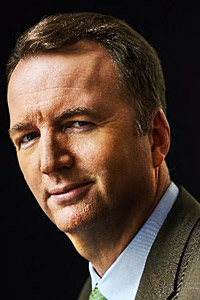
US President Donald Trump's absence from Asia-Pacific summits will do little harm to America's long-term standing in the region. It might even help.
The president's decision to skip two international meetings in November was predictably seen as evidence of American neglect of a vital region, underscoring the unilateralist instincts of Mr Trump. The complaints are fair.
But let's not mistake pageantry for trends that have been building for years and look inevitable. American influence is waning in ways that a few group photos won't fix.
It's far better for the US to engage consistently with the powers behind the two groups convening this fall, the Asia Pacific Economic Co-operation (Apec) group and the Association of Southeast Asian Nations (Asean).
To the extent that Mike Pence, who will represent the Trump administration, can stay on message, so much the better.
The annual Apec gathering of national leaders and CEOs long ago ceased to be of much substantive use.
Former US president Bill Clinton skipped two, and Barack Obama missed one.
The only president to attend each one during his tenure was George W Bush, who nonetheless was derided as a unilateralist.
(In retrospect, that seems harsh.)
When Apec first introduced a summit in 1993, it was huge. The choice of the first two venues was rich with symbolism as well: Seattle, then home to Boeing and Microsoft, and Bogor, Indonesia.
Locking in Southeast Asia's largest economy and Asia's elder statesman, Suharto, guaranteed RSVPs from everyone else.
It brought together leaders from 14 economies, including the US, China and Japan -- without Europeans. It was ground-breaking.
However, that membership has swollen to 21, and the sense of mission has faded, making any meaningful agreements elusive.
For an American president to skip the Asean meeting is a bit more consequential.
The 10 nations that make up the group are at a historical juncture. Their once-loose affiliation -- born of anti-communism at the height of the Vietnam War -- has evolved into something more. It's also a long way from the kind of common market, regulations and legal framework that characterise the European Union.
This group is being courted, and in some instances actually disrupted, by China. That makes a consistent US message to Asean all the more important -- and it will most probably be delivered reliably by the vice president.
It would be far better for Mr Trump to directly court Indonesia, the unofficial leader of the group.
It's hard to overstate Indonesia's influence on Asean, not just because the archipelago has the largest GDP, but also because of the region's history.
The original five nations wouldn't have come together without the overthrow of Sukarno and the ascent of Suharto.
As Marty Natalegawa notes in his new book Does Asean Matter: A View From Within, little happens at Asean without Indonesian stewardship.
Mr Trump might even find President Joko Widodo of Indonesia an interesting character. Jokowi is a populist from outside military circles. He was a businessman and is keen on infrastructure. And he has made adroit use of social media.
Mr Jokowi has also been careful to keep religious groups behind his coalition.
Mr Trump was right to stick with the G-20 summit in Argentina. That's where the real power is. The G-7 downgraded itself in 2009 when the G-20 was declared the premier financial conclave.
The arc of some global powers seems clear.
Economic influence inexorably shifts to Asia, regardless of Mr Trump's action, just as it shifted under multilateralists like Mr Clinton and Mr Obama. One or two meetings one year can't tip that kind of rebalancing.
Daniel Moss writes and edits articles on economics for Bloomberg Opinion. Previously he was executive editor of Bloomberg News for global economics, and has led teams in Asia, Europe and North America.
